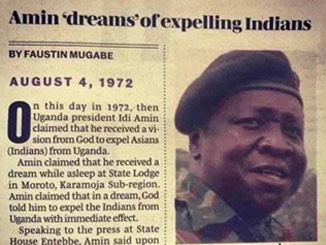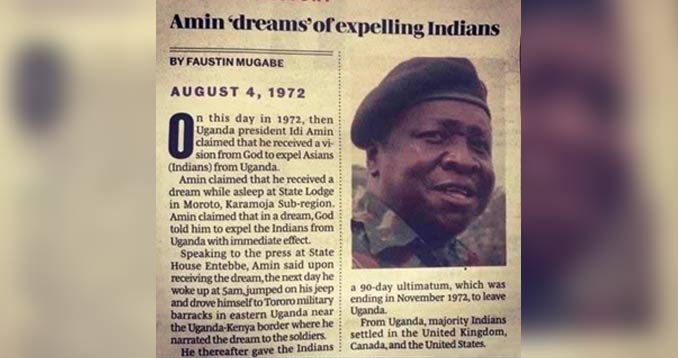

It was 50 years ago this August when Ugandan President expelled Asians. There are many reasons given for this including having a dream or divine inspiration. However, his actions reflected a growing resentments against Asians in Africa who had migrated there from India since the British occupation of Africa looking for better opportunities.
After Independence, many of the British had left, but the Asians who had prospered because the British gave them better opportunities than the Africans. This made the Asians the new upper class in Africa which had began to cause resentment among Africans that they were not masters in their own homelands after Independence.
Amin gave them 90 days to leave. Many went to the UK, Canada and the US. This displacement caused great hardship for many who were not use the western lifestyles. While many were prosperous in Africa, they had to work for others in the west. Many women who had never worked, had to work to help feed their families.
While many places welcomed them, many places like Leicester England where the City Council launched a campaign to oppose Ugandan Asians from migrating to the city but the ads did not have their intended effect. Instead they made migrants more aware of the possibility of settling in Leicester.
About 5000 to 6000 (nearly a quarter of initial Ugandan refugees) then settled in Leicester by the end of the 1970s another quarter of the Ugandan refugees had made their way to Leicester. Forty years later, Leicester’s City Mayor Sir Peter Soulsby said he regretted the action then.
According to the Uganda Resettlement Board over 28,000 Ugandan Asians came to Britain after being expelled by Idi Amin. Of the other refugees who were accounted for, 6,000 went to Canada, 4,500 refugees ended up in India and 2,500 went to nearby Kenya or Pakistan. Twenty-three thousand Ugandan Asians who had been granted Ugandan citizenship were, after some dispute, permitted to stay — yet many chose to leave rather than endure further intimidation, with only 4,000 known to have stayed.
It is vital to celebrate the resilience and resourcefulness of those who were displaced and forced to start all over again, far away from home.
The Curve Theatre in Leicester is putting on three plays this summer to mark the 50th anniversary of the arrival of Ugandan Asian refugees in Britain. The plays are being written by three people — Chandni Mistry, Ashok Patel and Dilan Raithatha — whose families and friends were caught up in the expulsions. We need more initiatives such as this, which highlight the experiences of those impacted by this momentous incident. Another play by Salim Rahemtulla called 90 Days opens in Vancouver on September 8.

Leave a Reply